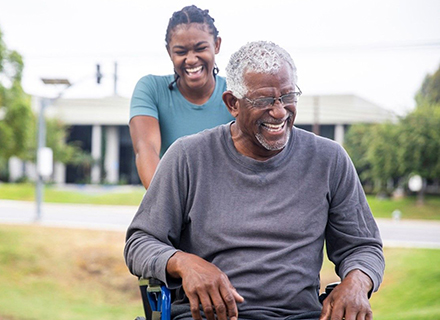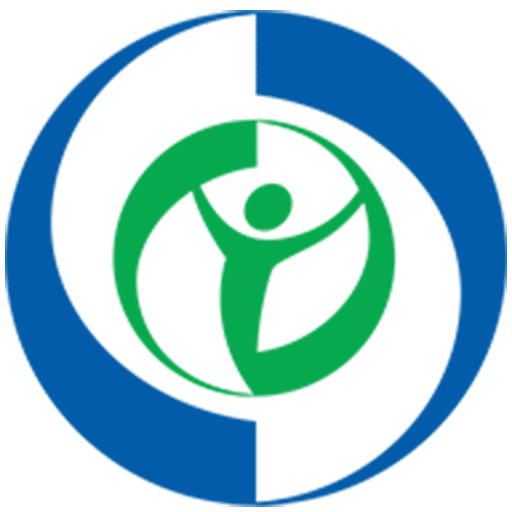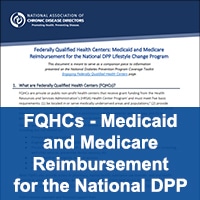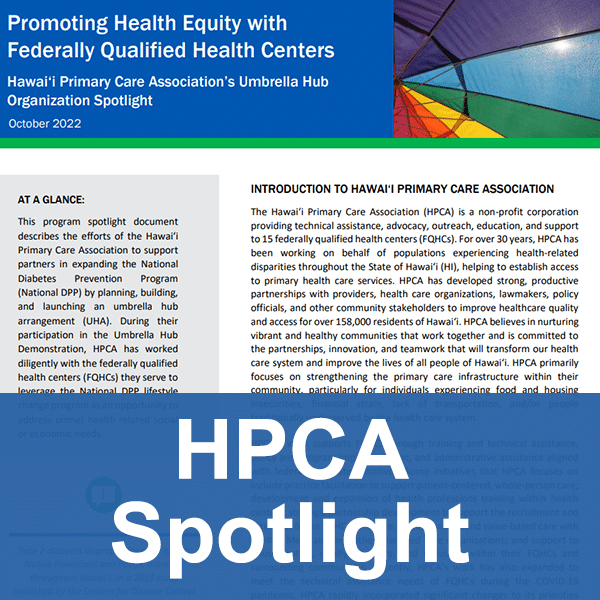Building Partnerships → Engaging FQHCs
Engaging Federally Qualified Health Centers
Federally Qualified Health Centers (FQHCs) are comprehensive, community-based primary care providers that offer affordable care in areas with high need for health care. Their location in communities and accessibility to patients makes FQHCs good candidates to deliver the National Diabetes Prevention Program (National DPP) lifestyle change program to their patient populations. This page focuses on Medicaid and Medicare reimbursement of FQHCs delivering the National DPP lifestyle change program. It is divided into the following two sections:
- What Are Federally Qualified Health Centers?
- How Can FQHCs Support the National DPP Lifestyle Change Program?
For those interested in learning more, the FQHCs: Medicaid and Medicare Reimbursement for the National DPP Lifestyle Change Program document provides additional information about FQHCs and their system for Medicaid and Medicare reimbursement for the National DPP lifestyle change program. The document contains additional information on each of the points listed on this page, as well as sources where more information can be obtained.
What Are Federally Qualified Health Centers?
FQHCs are private or public non-profit health centers that receive grant funding from the Health Resources and Services Administration (HRSA) to provide comprehensive health care services to medically underserved areas and populations.
FQHCs provide a wide range of health services, including:
- Primary health care services
- Diagnostic laboratory and radiology services
- Pharmaceutical services
- Patient case management services
- Preventive health services
- Public health education services
- Behavioral health services
- Oral health services
- Some urgent care services
How Can FQHCs Support the National Diabetes Prevention Program?
FQHCs can be effective providers and supporters of National DPP lifestyle change program services given their strong focus on primary, preventive, and public health education services as well as their attention to patient engagement and “whole person care,” including addressing health-related social needs (HRSN). The Hawai’i Primary Care Association (HPCA) and the Northeast Missouri Health Center (NMHC) have
Hawai’i Primary Care Association
The Hawai’i Primary Care Association (HPCA) has long-standing relationships with the FQHCs in Hawai’i and recognized that FQHCs are positioned well to deliver the National DPP lifestyle change program to the communities they serve. Beginning in 2015, HPCA utilized grant funding to assist FQHCs in obtaining and developing the needed resources to start delivering the National DPP lifestyle change program. HPCA was able to help eight FQHCs develop systems for screening, identifying, and referring eligible patients. By the end of the grant funding, eight FQHCs had established National DPP lifestyle change program cohorts.
In 2020, HPCA again utilized partnerships with FQHCs to establish an umbrella hub arrangement (UHA) in Hawai’i through the Centers for Disease Control and Prevention (CDC) Umbrella Hub Demonstration Project. Various FQHCs delivering the National DPP lifestyle change program were recruited to be subsidiary organizations in the UHA to help increase access to the program. The FQHCs participating in the UHA have worked with HPCA and Welld Health to develop a billing and claims system that allows reimbursement from payers to subsidiary organizations delivering the National DPP lifestyle change program. In addition, the billing and claims system is also capable of receiving reimbursement through the Centers for Medicare and Medicaid Services (CMS) for the Medicare Diabetes Prevention Program (MDPP). More information on HPCA’s work with FQHCs to support the National DPP lifestyle change program can be found in the HPCA Spotlight and the UHA Overview page of the Coverage Toolkit.
Northeast Missouri Health Center
The American College of Preventive Medicine (ACPM) documented the experiences of Northeast Missouri Health Center (NMHC), an FQHC in Kirksville, Missouri, in delivering the National DPP lifestyle change program, including efforts to increase screening, testing, and referrals. These strategies included using electronic health records (EHR), local events, and warm handoffs at clinical care appointments to identify eligible participants.
NMHC trained providers to discuss the program with patients and identify their readiness for change. NMHC also performed outreach and education at local events and through electronic billboards, clinic meetings, mailed letters, and in-office marketing products such as posters and flyers. Throughout these processes, NMHC was able to identify and address barriers identified by FQHC staff, including adjusting workflows to allow for support staff to educate and screen patients to reduce burdens on primary care physicians with competing patient health care priorities. More information on the CDC-funded case study is available in the ACPM document Increasing Physician Screening, Testing, and Referral of Patients with Prediabetes to the National DPP Lifestyle Change Program – A Case Study On Clinical Implementation.
FQHCs are important safety net providers and most FQHCs are Medicaid-enrolled providers. That said, FQHCs are reimbursed differently than traditional Medicaid providers. Rather than being paid a fee for each service provided, FQHCs receive a single, bundled rate for each qualifying Medicaid visit. This single rate, known as a “PPS rate,” is calculated on a per-visit (or encounter) basis and is designed to cover all qualifying services and supplies provided during the visit. This is an important consideration when including FQHCs as a Medicaid-enrolled provider type for the National DPP lifestyle change program.
What is the FQHC Medicaid PPS Rate?
Medicaid reimburses FQHCs through an encounter-based prospective payment system (PPS) for the state Medicaid-covered services FQHCs provide (i.e., services that are included in the Medicaid State Plan). The FQHC Medicaid PPS was created to ensure predictable and stable Medicaid reimbursement while protecting other federal investments that support operations and care provided to the uninsured (i.e., HRSA grant funds). The state pays FQHCs at the Medicaid PPS rates using a combination of state and federal funding, with the funding mix based on the individual state’s Federal Medical Assistance Percentage (FMAP).
States define which services are included in the PPS rate and establish limits on how many encounters an FQHC can bill per member per day. The PPS rate is a blended rate of all service costs (exclusive of costs or encounters for services paid separately from the PPS). States may also limit the number of reimbursable encounters in a year or require prior authorization for visits that exceed the amount allowed.
Some states pay the same PPS rate regardless of service type, but others differentiate between medical, behavioral health, and dental services.
A separate Medicaid PPS is determined for each FQHC in a state, calculated on a per-visit basis equal to the reasonable cost of services included in the rate. Rates are adjusted to address inflation and changes in the scope of services provided by each FQHC. Inflationary adjustments are typically made annually, while adjustments to reflect a change in an FQHC’s scope of services may occur more or less frequently depending on need and policies established by each state.
States also oversee the payment relationships their contracting Medicaid managed care organizations (MCOs) establish with FQHCs (see the “How Do Medicaid MCOs Reimburse FQHCs?” section below for more details).
Can Services be Paid for Separately from the PPS Rate?
Some Medicaid-covered services are not reimbursed via the PPS rate. Any costs associated with these services must be excluded from the FQHC Medicaid cost report or listed as a service that does not produce a billable encounter. The Medicaid cost report is a form on which FQHCs report the cost and utilization information necessary for the PPS rate. It is submitted to state Medicaid agencies for reimbursement.
Costs for services excluded from the PPS are generally submitted for reimbursement on a separate claim using a different billing number and may require a different National Provider Identifier (NPI). For example, Colorado uses a separate billing number to pay for pharmacy costs. Colorado FQHCs operating their own pharmacy must obtain a different Medicaid billing number for pharmacy services and bill all Medicaid prescriptions utilizing this number.
Some FQHCs use a different methodology to pay for services not included in the PPS rate. For example, some states use cost-based methodologies or actual acquisition costs for some medical products and devices.
How Would National DPP Lifestyle Change Program Services Be Reimbursed Through the PPS?
National DPP lifestyle change program services would either be included in an FQHC’s PPS rate (possibly necessitating a scope of service change over time depending on the extent of services being provided) or be reimbursed separately (i.e., FQHCs would bill the Medicaid agency under a different billing number).
Colorado
State Example
Colorado DSMES
While the National DPP lifestyle change program is not yet a Medicaid-covered benefit in Colorado, diabetes self-management education and support (DSMES) is covered under Medicaid and included under the PPS rate. The FQHC’s program must be recognized by the American Diabetes Association (ADA) or the Association of Diabetes Care & Education Specialists (ADCES) as a DSMES provider to be reimbursed for these services.
If ADA or ADCES recognizes the FQHC’s program, the FQHC may include DSMES costs in the cost report, as well as generate an encounter when there is a one-on-one, face-to-face visit with an eligible provider. Even if the visit does not generate an encounter, the costs may still be included in the cost report and used in subsequent calculations that determine the FQHC’s per-visit encounter rate. If the program at the FQHC is not recognized, the services are not considered to be covered services.
Illinois
State Example
Illinois
In Illinois, FQHCs are reimbursed through fee-for-service methodology, rather than through their PPS encounter rate. FQHCs delivering the National DPP lifestyle change program (and DSMES) are required to obtain a separate NPI to bill for diabetes prevention and management services. Additionally, FQHCs are required to obtain pending, preliminary, or full CDC recognition status before creating a separate enrollment in the Illinois IMPACT provider enrollment system as a Diabetes Prevention Provider Organization (Legacy PT 102) to obtain reimbursement for delivery of the National DPP lifestyle change program.
Additional information on FQHC reimbursement of diabetes prevention and management services in Illinois is available in the Illinois National DPP and DSMES Provider Notice.
Montana
State Example
Montana
In Montana, the National DPP lifestyle change program is paid for under the state’s PPS as long as the service is provided by an approved provider (physician, nurse practitioner, physician assistant (PA), clinical pharmacist practitioner, etc.).
For more information on Montana’s Medicaid coverage of the National DPP lifestyle change program, visit the Montana State Story of Medicaid Coverage page of the Coverage Toolkit.
New York
State Example
New York
In New York State (NYS), FQHCs providing National DPP lifestyle change program services are required to obtain a new, unique NPI for the purpose of enrolling in Medicaid as a National DPP service provider. The FQHC enrolls in Medicaid under the new NPI and will be identified as a community-based organization (CBO). This identification does not affect or impact any other aspect of the clinic’s Medicaid provider enrollment file. Once the FQHC has been enrolled as a CBO and assigned the required Category of Service and Specialty Code they may begin submitting claims to Medicaid for National DPP services rendered to Medicaid members.
This organizational structure allows for CDC-recognized FQHCs to be enrolled in NYS Medicaid as a National DPP service provider under a new NPI for the purpose of rendering these non-medical, group-based educational support services to Medicaid members in any service location within the community. NYS Medicaid National DPP services are submitted to Medicaid on a professional claim type form via the CMS-1500 paper claim form, or its electronic equivalent, and are not reimbursable using either rate-based PPS, or Ambulatory Patient Group (APG) reimbursement methodologies.
For more information on New York State’s Medicaid coverage of the National DPP lifestyle change program, visit the New York State Story of Medicaid Coverage page of the Coverage Toolkit.
How Do Medicaid MCOs Reimburse FQHCs?
MCOs have broad flexibility in how they pay FQHCs for Medicaid-covered services and are not required to use FQHC Medicaid PPS rates. For example, MCOs can pay FQHCs a negotiated rate for being part of their network of providers and can incorporate FQHCs into value-based payment arrangements, including financial risk and shared savings related to meeting quality, outcome, and cost measures (e.g., diabetes prevention or management). However, this payment flexibility may cause some FQHCs to receive less compensation from MCOs than they would under the state’s PPS rates. Under federal law, FQHCs that participate in managed care networks must eventually receive a payment that is at least equal to what the state would have paid under the PPS (in aggregate). When total MCO payments to an FQHC are less than what the MCO would have been paid under the PPS, the state must make periodic supplemental payments to the FQHC for the difference between the amount paid by the MCO and the amount to which the clinic is entitled under the PPS.
Additionally, MCOs must pay FQHCs at least what they would pay non-FQHC providers in their network for the same medical services. Therefore, in cases where Medicaid covers the National DPP lifestyle change program, MCOs would be required to pay FQHCs at least what they would pay other CDC-recognized organizations.
MCOs can also contract with FQHCs to provide value-added services, like the National DPP lifestyle change program. These services are not covered by Medicaid and are paid for by the MCO outside of their capitated rate.
How Do FQHCs Bill for Medicare Diabetes Prevention Program (MDPP) Services?
In general, FQHCs bill Medicare using the Medicare FQHC Prospective Payment System (PPS), which is different than FQHC’s Medicaid PPS rates. Unlike Medicaid, there is not a process for adding additional services under the Medicare FQHC PPS. Since MDPP is not an FQHC PPS designated service, it is therefore not included in the Medicare FQHC PPS base payment rate.
To be reimbursed for MDPP services, FQHCs must enroll as an MDPP supplier and ensure no commingling of FQHC resources used to furnish MDPP services by excluding all costs related to MDPP services from its Medicare FQHC PPS cost report. Instead, FQHCs submit claims for MDPP services under a separate MDPP supplier agreement. FQHCs use the CMS-1500 paper claim form or its electronic equivalent to bill for MDPP services under their MDPP supplier NPI. For more information, see the Medicare Diabetes Prevention Program (MDPP) Basics page of the Coverage Toolkit.
HPCA successfully submitted their MDPP supplier application on February 9, 2022, and was approved as an MDPP supplier. This was a key step in operationalizing their UHA. By achieving MDPP supplier status, HPCA can now submit claims on behalf of each participating subsidiary organization within the UHA, including the FQHCs that are subsidiary organizations. This eliminated the need for subsidiary organizations to complete their own MDPP applications. To learn more about the challenges HPCA faced during this process, see the HPCA Spotlight.











